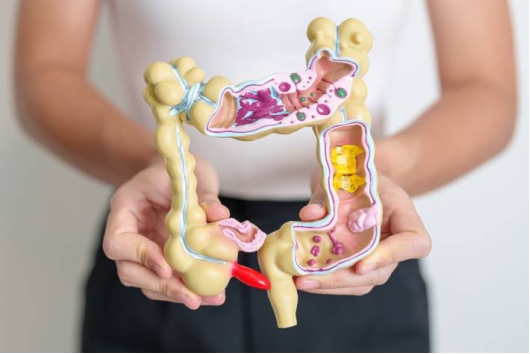鍼灸師募集|未経験歓迎・正社員・パート・アルバイト多数
Soothing Colitis Flare-Ups: The Best Gentle Diet Foods for Relief
Colitis is an inflammatory condition of the colon that can cause a variety of distressing symptoms, including abdominal pain, diarrhea, fatigue, and bloating. Managing flare-ups of colitis involves more than just medication—it requires careful attention to diet. A gentle, anti-inflammatory diet can help calm the digestive system, reduce symptoms, and promote healing. During flare-ups, it is especially important to choose foods that are easy to digest, nourish the body, and reduce gut irritation.
Colitis is an inflammatory condition of the colon that can cause a variety of distressing symptoms, including abdominal pain, diarrhea, fatigue, and bloating. Managing flare-ups of colitis involves more than just medication—it requires careful attention to diet. A gentle, anti-inflammatory diet can help calm the digestive system, reduce symptoms, and promote healing. During flare-ups, it is especially important to choose foods that are easy to digest, nourish the body, and reduce gut irritation.

1. What is Colitis?
Colitis refers to inflammation of the colon, which can occur due to various conditions such as ulcerative colitis, Crohn’s disease, or infections. The symptoms can range from mild to severe and include:
- Abdominal cramps
- Diarrhea(sometimes with blood)
- Fatigue
- Bloating
- Weight loss
A well-balanced diet plays a vital role in managing colitis flare-ups. While the right foods can soothe inflammation, some foods may aggravate the condition. During flare-ups, the digestive system becomes sensitive, so it's essential to choose foods that are gentle, easy to digest, and nutrient-dense to support gut health.
2. Foods That Soothe Colitis Flare-Ups
-
Low-Fiber Foods
Fiber is essential for digestion, but during a colitis flare-up, it can be irritating to an inflamed colon. Opting for low-fiber foods can help reduce discomfort and minimize strain on the digestive system.
- White rice: A simple, low-fiber option that is easy to digest and helps soothe the stomach.
- Plain pasta: Like white rice, plain pasta is gentle on the digestive system during flare-ups.
- Refined white bread: Unlike whole grains, white bread contains less fiber and is easier to tolerate during colitis flare-ups.
- Cooked potatoes: Soft, skinless, well-cooked potatoes are low in fiber and gentle on the stomach.
- Crackers: Simple crackers or white bread can provide easily digestible carbohydrates that offer comfort without aggravating symptoms.
-
Lean Proteins
Protein is vital for tissue repair and immune function, but during flare-ups, it is important to select proteins that are gentle on the gut and won't worsen inflammation.
- Skinless chicken: Grilled, boiled, or baked chicken without the skin is a lean protein that’s easy to digest.
- Turkey: Like chicken, lean turkey is a great source of protein that can be more easily digested than red meats.
- Eggs: Soft-boiled or scrambled eggs are mild and easy to digest, providing necessary nutrients during flare-ups.
- Tofu: For those who follow a vegetarian or plant-based diet, soft tofu is an excellent source of protein that is gentle on the digestive system.
-
Cooked Vegetables
Raw vegetables can be harsh on the gut, especially when the digestive system is inflamed. Cooked vegetables, however, are generally easier to tolerate and can provide essential nutrients without exacerbating symptoms.
- Carrots: Soft, well-cooked carrots are easy to digest and packed with beneficial vitamins and antioxidants.
- Zucchini: A mild vegetable that can be cooked until soft, providing fiber and nutrients without causing irritation.
- Pumpkin: Gentle on the stomach, pumpkin can help ease digestion and reduce discomfort due to its soothing properties.
- Sweet potatoes: Rich in vitamins and minerals, sweet potatoes can be easily digested when peeled and cooked well.
-
Healthy Fats
In moderation, healthy fats can be beneficial during a flare-up. They can help reduce inflammation and provide essential nutrients without irritating the gut.
- Olive oil: A source of anti-inflammatory compounds, olive oil can be used for cooking or drizzling over vegetables.
- Avocado: Soft and easy on the stomach, avocado is rich in healthy fats and can be added to smoothies or used as a spread.
- Coconut oil: Rich in medium-chain triglycerides (MCTs), coconut oil may be easier to digest than other fats and can help soothe the digestive tract.
-
Bone Broth
Bone broth is a nourishing, healing food that’s incredibly soothing for the gut. It’s rich in gelatin, collagen, and amino acids like glutamine, which can help heal the lining of the intestines and reduce inflammation. Bone broth also provides essential nutrients and is easy to digest, making it an ideal choice during colitis flare-ups.
3. Hydrating Fluids for Colitis Relief
Staying hydrated is crucial during colitis flare-ups, especially since diarrhea can lead to dehydration. Hydrating fluids help replenish lost fluids, soothe the gut, and support digestion.
- Water: The best option for staying hydrated without irritating the digestive system.
- Herbal teas: Peppermint, ginger, or chamomile teas are soothing to the stomach and can help reduce nausea and bloating.
- Clear broths: In addition to bone broth, vegetable or chicken broths are excellent choices for hydration and provide gentle nourishment.
- Electrolyte drinks: For individuals experiencing significant fluid loss, electrolyte drinks without added sugars or artificial sweeteners can help replenish essential minerals.
4. Foods to Avoid During a Colitis Flare-Up
While certain foods help soothe colitis symptoms, others can worsen the condition by irritating the digestive system. It’s essential to avoid the following foods during a flare-up:
-
High-Fiber Foods
- Raw fruits and vegetables: These can be difficult to digest and can cause gas, bloating, and abdominal discomfort.
- Whole grains: Whole wheat bread, brown rice, oats, and other whole grains are higher in fiber and may irritate the colon during flare-ups.
- Legumes and beans: These foods are high in fiber and can lead to gas, bloating, and discomfort.
-
Dairy Products
Many individuals with colitis experience lactose intolerance, which can worsen symptoms. It is best to avoid:
- Milk: Whether whole, skim, or low-fat, milk can be difficult to digest during flare-ups.
- Cheese: While hard cheeses may be somewhat easier to digest than soft cheeses, many individuals find dairy products aggravate colitis symptoms.
- Ice cream: Dairy-rich and high in fat, ice cream can irritate the digestive tract.
-
Fatty and Fried Foods
High-fat foods, particularly those that are fried or processed, can exacerbate symptoms and increase inflammation in the intestines.
- Fried foods: French fries, fried chicken, and other deep-fried foods can be hard on the digestive system.
- Processed meats: Sausages, bacon, and deli meats are often high in unhealthy fats and additives that may irritate the gut.
-
Spicy Foods
Spices like chili, hot peppers, and curry can be irritating to the stomach and intestines. Avoid spicy foods and strong condiments such as hot sauce during flare-ups.
-
Caffeinated Beverages and Alcohol
- Caffeine: Caffeine can stimulate the intestines and worsen diarrhea and cramping, so it’s best to avoid coffee, caffeinated tea, and sodas during flare-ups.
- Alcohol: Alcohol can irritate the gut, trigger inflammation, and dehydrate the body, making it essential to avoid during colitis flare-ups.
5. Additional Tips for Managing Colitis Flare-Ups
- Eat small, frequent meals: Smaller meals are often easier on the digestive system than larger ones.
- Chew food thoroughly: Proper chewing aids digestion and can reduce the strain on your gut.
- Consider an elimination diet: To pinpoint specific food triggers, try eliminating common irritants like gluten, dairy, and processed foods one at a time to identify what worsens your symptoms.
Conclusion
Managing colitis flare-ups with diet is one of the most effective ways to reduce inflammation, alleviate symptoms, and promote healing of the gut. A gentle diet that focuses on low-fiber foods, lean proteins, cooked vegetables, healthy fats, and hydrating fluids can help calm your digestive system and provide much-needed relief. At the same time, avoiding foods that irritate the gut, such as raw vegetables, dairy, fatty foods, and alcohol, can help prevent further discomfort.
As always, it’s important to consult with a healthcare provider or nutritionist to tailor your diet to your specific needs and ensure you are getting the proper nutrients during flare-ups.











